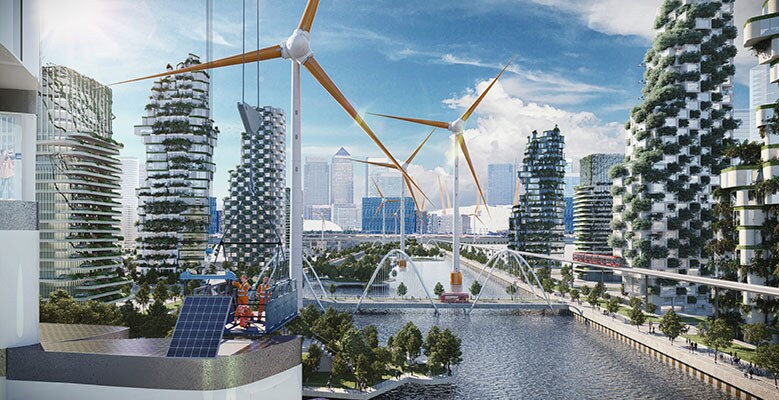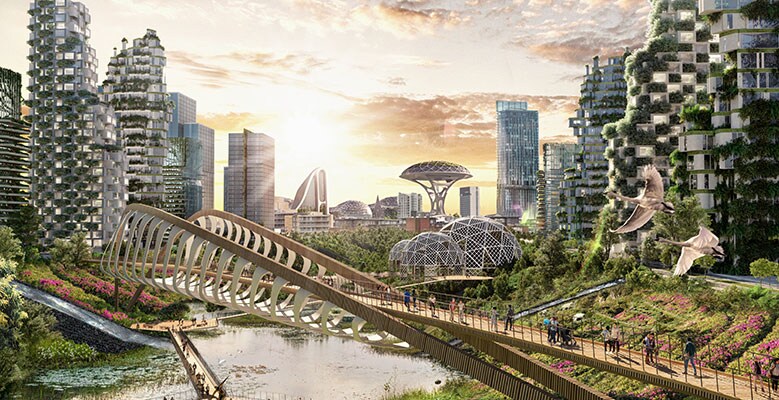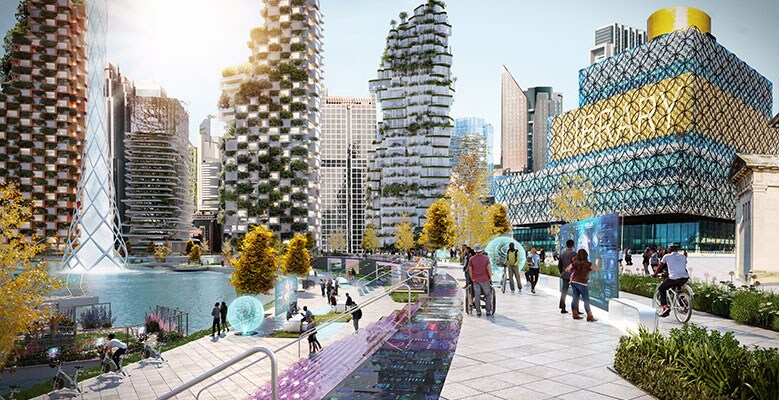Co-existing seamlessly with nature, generating clean energy, creating jobs and supporting everyone in society sounds pretty sweet right? We thought it was time to do more than hope for a delicious vision for the future, so we teamed up with The Climate Coalition and Serena Pollastri, Professor of Urban Future at University of Lancaster and co-author of the UK Government’s Foresight Future of Cities Project to serve up the ‘Save Our Swirled NOW!’ art series – giving a taste of the sweeter future we could all enjoy if the UK government acts now to combat the lasting and damaging effects of climate change.
The three images tell a story of a world of neighbourhoods filled with community gardens and nature corridors that allow ecosystems to flourish, “living” green buildings, rain absorbing skyscrapers and green, accessible transport. Something, Serena and our friends at The Climate Coalition think could become a reality by 2100, if radical but much needed measures are considered now as part of the UK’s post-Covid economic recovery plan.
Each image represents one of the three asks proposed by our friends at The Climate Coalition in the declaration of their Time is Now campaign, asking the UK Prime Minister to take ambitious action for a green economic recovery. We need YOUR support to make this future happen.

A clean energy revolution:
- The introduction of carbon quotas on different emissions both at an individual and corporation level will steer us towards increasingly carbon-conscious lifestyles.
- At home, combined heat and power systems will replace central heating boilers that used to. Photovoltaics (solar panels) will be on every roof and fuel cells within the home allow for efficient energy storage.
- New and retrofitted buildings now abide by the Zero Energy Building Standard regulations, and at the city level, temperature is controlled through channels between buildings and public spaces that are planned in urban areas, to allow cool air to flow.
- Desalination plants in coastal cities to guarantee clean water in times of water shortages, powered by tidal wave systems. Off-shore wind farms provide most of the energy that is redistributed through the national grid.
- Cities are mostly car-free, and flexible, efficient, affordable mobility is guaranteed by a strong integrated network of low carbon transport solutions, including pedestrian and cycle routes, light rails, bike sharing schemes, and electric trams and buses.

Flourishing green and wild spaces:
- Cities and towns will have a higher density of flora and fauna, with neighbourhoods infilled with functional green spaces, community gardens, and nature corridors.
- A huge reduction in car travel freed up space previously occupied by cars, including roads and car parks, resulting in the planting of trees and plants to form a network of green corridors linking urban parks with forests, and other rewilded areas outside the city. These provide habitat and resources for urban wildlife, as well as services to the urban human population.
- To promote biodiversity, some green areas have been dedicated to the preservation of flora and fauna, with a particular focus on native and endangered species.
- Cities have been designed to absorb rainwater and channel it through various bodies of water to improve drainage, reduce floods and provide efficient irrigation.
- With the absence of cars, subsidised low carbon mobility systems such as cycle paths, light rails, and paved walkways snake through the city.
- Green and blue infrastructures are resources that are used by people of all ages, and outdoor life is now the norm - urban forest school programmes, for example, are essential parts of the national curriculum.
 More resilient and diverse communities:
More resilient and diverse communities:
- Cities set out policies to reinvent themselves as 15-minutes cities. In these cities, “all residents are able to meet most of their needs within a short walk or bicycle ride from their homes”.
- The 15-minute city model and linked it with new, low carbon, collaborative modes of access and consumption based on sharing, open access, and commoning.
- Public libraries are at the heart of the neighbourhoods and provide modern and flexible spaces for communities to read, learn, and work.
- Shared working spaces are used by local Citizen Assemblies, who work alongside the council to develop strategies and policies. These Citizen Assemblies are instrumental to influence decision making at the national level and to keep the government accountable.
- The adoption of Universal Basic Income and the reduction of the working week to 4-days on average, enables people to invest more time into creative and wellbeing pursuits. They do so by taking full advantage of neighbourhood spaces and tool libraries that they can access to design, produce, and mend consumer goods, including home supplies and appliances.
Already major threats to human life and our planet due to climate change are a reality. But change is possible. The clean, green and fair future depicted in this art series is possible, and we know the UK public supports this. A huge 75% of the UK believe rebuilding from covid is a unique opportunity to ensure a greener recovery. Our leaders can and must act now. Add your voice to the Climate Coalitions declaration and demand a future based on climate justice.
Take action Now!
Sweeten Up Your Inbox!
Subscribe now and we'll make sure you get the inside scoop on Ben & Jerry's fun and flavours! It's like dessert for your inbox, and you're going to want seconds.
Recent Articles
Sweeten Up Your Inbox!
Subscribe now and we'll make sure you get the inside scoop on Ben & Jerry's fun and flavours! It's like dessert for your inbox, and you're going to want seconds.

